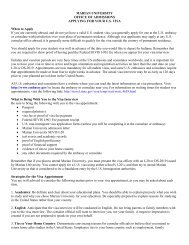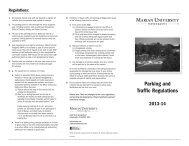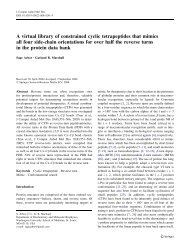2009-11 Marian University Course Catalog, fall 2010 edition
2009-11 Marian University Course Catalog, fall 2010 edition
2009-11 Marian University Course Catalog, fall 2010 edition
You also want an ePaper? Increase the reach of your titles
YUMPU automatically turns print PDFs into web optimized ePapers that Google loves.
3. The student next meets with the dean of the<br />
appropriate school, presenting the documents<br />
generated in previous steps. This meeting is to be<br />
documented by means of a memorandum of record<br />
containing the meeting date, a summary of the results<br />
of the meeting, and the signatures of the student and<br />
dean. If there is no resolution at this level, then move<br />
to step four.<br />
4. The student must submit a written appeal to the dean<br />
of academic affairs with a copy to the dean with whom<br />
the student met in the previous step. The written<br />
appeal must state what is requested concerning the<br />
grade, the reasons that the assigned grade is not<br />
considered a complete or fair assessment of work<br />
accomplished in the course, and must be accompanied<br />
by the documents of record generated in each of the<br />
previous steps. The time limit for filing the written<br />
appeal with the dean of academic affairs is six weeks<br />
from the release of grades.<br />
5. The dean of academic affairs presents the written case<br />
and documentation to the vice president for academic<br />
affairs (VPAA). If the VPAA determines that further<br />
clarification is needed to reach a decision, a meeting is<br />
arranged involving the student, the instructor, and the<br />
VPAA for discussion of the appeal. The purpose of this<br />
meeting is primarily clarification of the situation.<br />
6. After considering all the information received, the final<br />
decision on the fairness of the grade is made by the<br />
VPAA. In this context, “fairness” applies to the<br />
objective and unbiased assignment of the grade. If the<br />
VPAA determines that the grade was unfairly assigned,<br />
this decision is conveyed to the instructor, the<br />
chairperson, and/or dean of the school for objective<br />
and unbiased correction. The student will receive<br />
written documentation of the outcome.<br />
Academic Forgiveness Policy<br />
An academic forgiveness policy option is available to <strong>Marian</strong><br />
<strong>University</strong> students who re-enroll at <strong>Marian</strong> <strong>University</strong> after a<br />
lapse of five or more years. The following guidelines apply:<br />
1. An academic advisor should discuss this policy with<br />
the student at the time of re-enrollment. Students<br />
must file a completed request with the dean of<br />
academic affairs before the end of their first<br />
academic semester back. The request form must be<br />
signed by the student and the academic advisor.<br />
2. Only course grades of “C-” or better apply to the<br />
current degree: these are not calculated in the GPA.<br />
3. All courses and grades remain on the record. GPA is<br />
calculated from returning point forward.<br />
4. The Academic Forgiveness Policy can only be used<br />
one time and is non-reversible.<br />
5. Students who have previously earned a degree or<br />
have a cumulative GPA of 2.00 or higher are not<br />
eligible.<br />
6. The transcript states that an Academic Forgiveness<br />
Policy is in effect.<br />
7. Students accepting this policy are eligible for<br />
academic honors after accumulating 60 new earned<br />
hours.<br />
REGISTRATION POLICIES<br />
Class Level<br />
Class level is defined by the number of credits earned: 30<br />
credits are needed for sophomore status, 62 for junior status,<br />
and 94 for senior status.<br />
Registration and Class Changes<br />
Students are encouraged to advance register for classes. Class<br />
choices made at advanced registration are guaranteed up<br />
until the time payment arrangements must be made unless<br />
the class is canceled due to limited enrollment or for other<br />
causes. Students will be notified if the class is canceled. If<br />
students fail to make payment arrangements at the assigned<br />
time, the class spot will revert to a student who has<br />
completed payment arrangements.<br />
Up to the Friday after classes begin, a course may be added<br />
to a student’s schedule with the approval of the instructor<br />
and the academic advisor.<br />
A course may be dropped with no record during the first<br />
week of classes. From the second week through the end of<br />
the 10th class week, a course may by dropped with a grade of<br />
“W” provided the student processes the official change of<br />
registration form. (See Grading System for details.) A fee is<br />
charged, perform submitted, for changes made after the first<br />
week of classes.<br />
<strong>Course</strong> Load<br />
The normal load for a full-time student is 12-18 credits per<br />
semester. Because academic performance may suffer when<br />
an overload is taken, students in good standing (2.00 GPA or<br />
above) wishing to take 19 credits or more and students with<br />
less than a 2.00 GPA wishing to exceed 16 credits must<br />
petition the Office of Academic Affairs for approval. Full-time<br />
students earning fewer than 16 credits per semester will not<br />
be able to complete degree requirements in the prescribed<br />
period (four years for a bachelor degree and two years for an<br />
associate degree) unless additional credits are taken during<br />
summer school or during regular semesters or are earned<br />
through examination. An additional per credit fee is charged<br />
for enrolling in over 20 semester credit hours.<br />
33

















